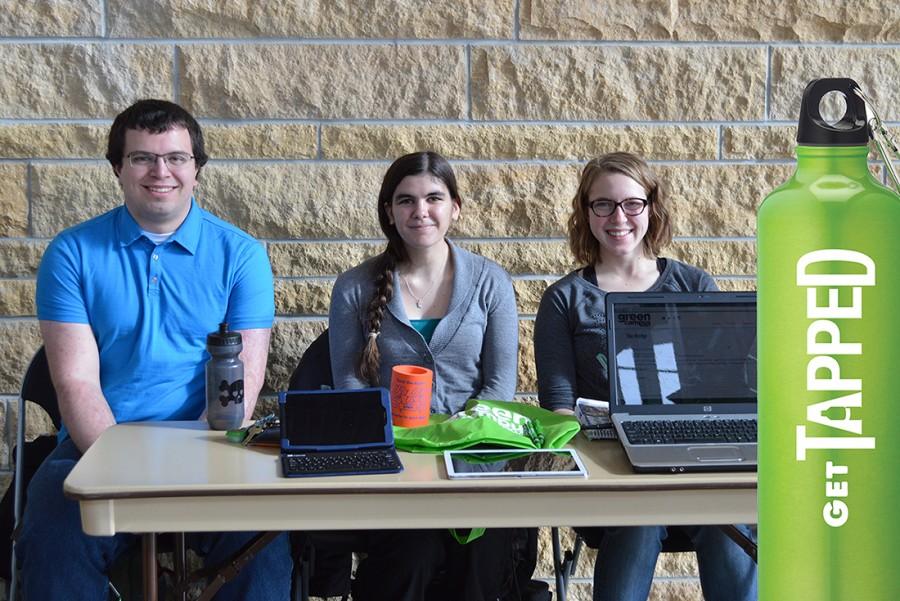Green Campus Project tells students to “Get Tapped”
Students seek to reduce plastic bottle waste and encourage drinking tap water.
Matt Lindberg, senior sustainable renewable energy systems major, Valeries McGoldrick, freshman soil and crop science major and Andrea Wenzel, senior animal science major work at getting pledges at the Markee Pioneer Student Center. Green Campus Project promotes reusable water bottles.
University of Wisconsin-Platteville’s Green Campus Project is collecting pledges to reduce the use of plastic water bottles on campus.
The group began staffing a table in the Markee Pioneer Student Center over the past week, displaying the slogan “Get Tapped.” The slogan was inspired by the title of the 2009 documentary Tapped. According to the documentary’s official website, tappedthemovie.com, the documentary is a “behind-the-scenes look into the unregulated and unseen world of an industry that aims to privatize and sell back the one resource that ought never to become a commodity: our water.”
The Green Campus Project will be showing “Tapped” in Doudna Hall on Feb. 11, and the first one hundred students will receive a free reusable water bottle, senior animal science major Andrea Wenzel said.
Senior electrical engineering major, and president of the Green Campus Project, Alexander Caracciolo also chose the slogan to give the campaign an “edgy flair.” He said that a past campaign featuring shirts with the slogan “save energy, do it in the dark” were popular with UW-Platteville students.
Wenzel, who is vice president of the project, said the main goal of collecting pledges is to reduce the number of plastic water bottles ending up in landfills. The group collected 21 pledges on the first day.
Caracciolo said that UW-Stout has ran a similar campaign. The campaign, called “I Love Tap Water,” plus the installation of hydration stations has resulted in the reduction of 70,000 bottles on the UW-Stout campus, according to their website.
The groups’ efforts come at a time of ongoing national discussion concerning water safety and privatization.
The city of Flint, Michigan made national headlines when they changed their water source, resulting in contamination and serious health consequences for thousands of residents.
“We had this all planned before the Flint water thing,” Wenzel said. “When [that] came up, it brought up a lot of discussion. It definitely brought the safety of water into light.”
The goal of the pledge efforts is to encourage people to drink tap water.
“Aside from the Flint water thing, tap is usually better,” Wenzel said.
For now, the group is focusing on raising awareness, but Wenzel mentioned that in the future she would like to see more things being done.
“Eventually, if we can compile enough pledges, we would like to see a petition to prevent the sale of bottled water on campus,” Wenzel said. Besides reducing the number of plastic bottles going into landfills, Wenzel said she thinks such a measure would also save the campus money.




